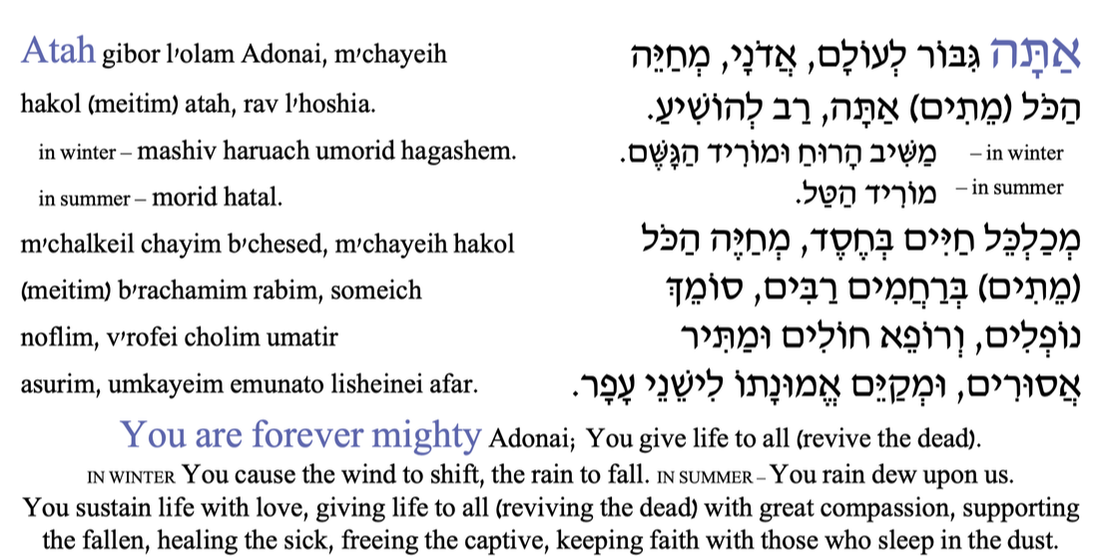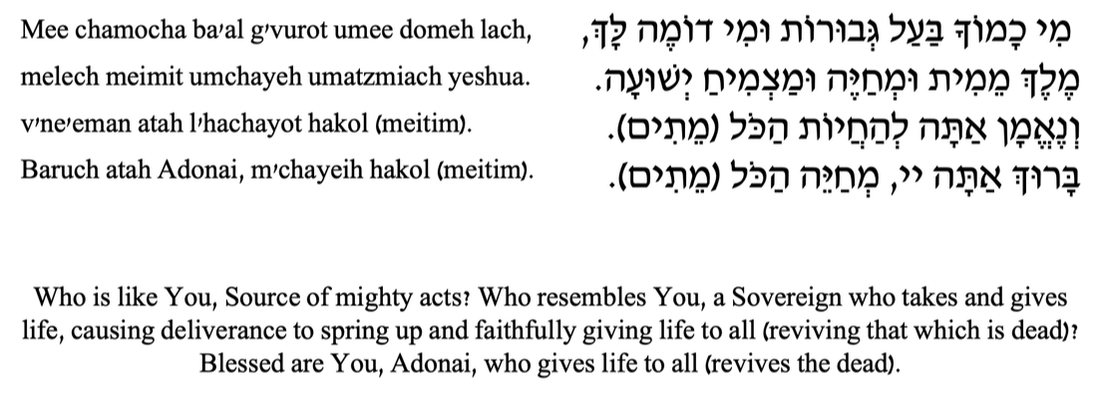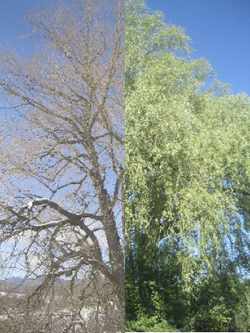G'vurot
| G'vurot |
Mishkan T'filah, pages 325
Why is there a blessing about death?
The second blessing of the T'filah is called the G'vurot, which means "Strength." The blessing acknowledges that God has power over our lives, focussing on two areas where we most immediately think of God's power: the weather and death.
In the contemporary world, we might think that the weather is not so important. We have clothing and homes that help us deal with almost any weather. However, in ancient times, the weather was a matter of life and death every day. If the rain did not fall at the right time of year, the crops would not grow and people would die. That is why the words of the blessing change over the course of the year; we pray for the right weather that is needed in each season.
Our mortality is the second major theme of the blessing. We human beings are temporary and we realize that death is the common fate of everyone who lives. The blessing refers to God as the source of life and death. When we think of God's power in our lives, we also think about the fragility of our lives, about how life is a gift from God, and how death is part of the reality of the world.
The traditional version of this blessing made the theme of life and death even more clear. The older version of the blessing uses the words in parentheses that speak of God who "revives the dead." The Reform Movement originally changed those words to "gives life to all" in both the English and the Hebrew. The early Reformers rejected the traditional language because it refers to the idea that God will bring all those who have died back to life at the end of time – a literal belief that is rejected by Reform Judaism.
However, the idea of God "reviving the dead" does not have to be understood on a literal level. We can think of God as reviving us from death when we are healed from sickness or when we emerge from a life threatening situation. Also, we can think of God "reviving the dead" when we keep people alive in our memories after they have died. Mishkan T'filah was the first prayerbook to offer both the traditional form of the blessing (in parentheses) and the revised language of the Reform Movement.
In the contemporary world, we might think that the weather is not so important. We have clothing and homes that help us deal with almost any weather. However, in ancient times, the weather was a matter of life and death every day. If the rain did not fall at the right time of year, the crops would not grow and people would die. That is why the words of the blessing change over the course of the year; we pray for the right weather that is needed in each season.
Our mortality is the second major theme of the blessing. We human beings are temporary and we realize that death is the common fate of everyone who lives. The blessing refers to God as the source of life and death. When we think of God's power in our lives, we also think about the fragility of our lives, about how life is a gift from God, and how death is part of the reality of the world.
The traditional version of this blessing made the theme of life and death even more clear. The older version of the blessing uses the words in parentheses that speak of God who "revives the dead." The Reform Movement originally changed those words to "gives life to all" in both the English and the Hebrew. The early Reformers rejected the traditional language because it refers to the idea that God will bring all those who have died back to life at the end of time – a literal belief that is rejected by Reform Judaism.
However, the idea of God "reviving the dead" does not have to be understood on a literal level. We can think of God as reviving us from death when we are healed from sickness or when we emerge from a life threatening situation. Also, we can think of God "reviving the dead" when we keep people alive in our memories after they have died. Mishkan T'filah was the first prayerbook to offer both the traditional form of the blessing (in parentheses) and the revised language of the Reform Movement.






